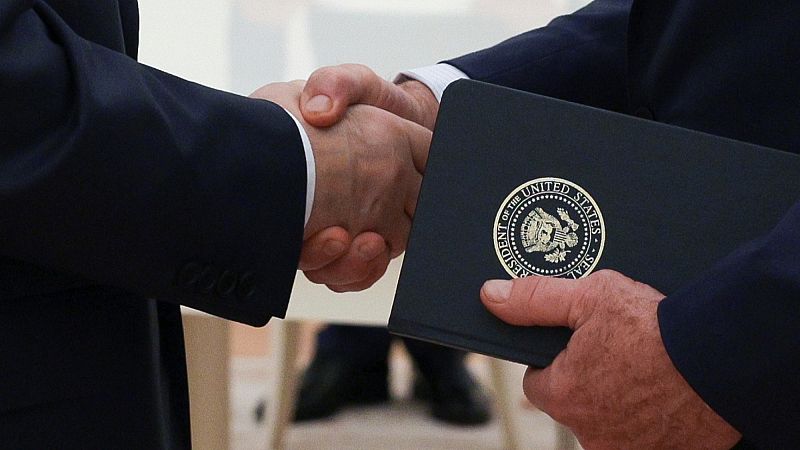
Trump Announces Meeting with Putin in Alaska to Discuss Ukraine War
President Donald Trump has announced plans to meet with Russian President Vladimir Putin next Friday in Alaska. The discussion will focus on ending Moscow's ongoing war in Ukraine, which has been raging for over three years. This meeting comes as a significant development in the ongoing diplomatic efforts to resolve the conflict.
Trump shared the details of the meeting on social media early Saturday. The information was later confirmed by Putin’s aide, Yury Ushakov, according to reports from Russian state-run agencies. The announcement marks a shift in the usual approach to such high-level meetings, as it is unusual for a U.S.-Russia summit to be held on American soil rather than in a neutral third country.
According to a U.S. official speaking to CBS News, Trump is open to a trilateral meeting that would include Ukrainian President Volodymyr Zelenskyy. Such a summit could play a critical role in addressing the long-standing conflict, although there is no guarantee that it will halt the fighting given Russia’s maximalist demands.
Before confirming the date and location of the meeting, Trump made comments to reporters at the White House. He suggested that any potential agreement might involve “some swapping of territories,” though he provided no specifics. This statement highlights the complexity of negotiations between the involved parties.
Zelenskyy's Stance on Territorial Issues
In response to the news, Ukrainian President Volodymyr Zelenskyy expressed his position on the territorial question in a Telegram post. He stated, “The answer to the Ukrainian territorial question already is in the Constitution of Ukraine. No one will deviate from this – and no one will be able to. Ukrainians will not gift their land to the occupier.”
Zelenskyy emphasized the importance of a dignified peace, stating, “The Ukrainian people deserve peace. But all partners must understand what a dignified peace is. This war must be brought to an end – and Russia must end it.” He also expressed willingness to work with Trump and other international partners to achieve real and lasting peace.
Trump's Approach to Peace Talks
Trump’s decision to host Putin on U.S. soil broke expectations that the meeting would take place in a third country. Qatar, the United Arab Emirates, and the Vatican had previously been suggested as possible venues. However, the choice of Alaska signals a different approach to diplomacy.
Putin’s last visit to the U.S. was in 2015 when he attended the UN General Assembly meeting in New York. The upcoming meeting in Alaska would be the first U.S.-Russia summit since 2021, when former President Joe Biden met Putin in Geneva.
After announcing a peace deal aimed at ending decades of conflict between Armenia and Azerbaijan, Trump said he planned to meet with Putin “very shortly.” His subsequent post confirmed the meeting would take place on 15 August in Alaska, with more details to follow.
Trump mentioned that the summit would have occurred sooner, but noted that “security arrangements” needed to be made. He expressed belief that both Putin and Zelenskyy want peace, adding, “In all fairness to President Zelenskyy, he’s getting everything he needs to, assuming we get something done.”
When asked if this was the last chance to make a major peace deal, Trump responded, “I don’t like using the term last chance,” and said, “When those guns start going off, it’s awfully tough to get ’em to stop.”
Pressure on Russia and Diplomatic Challenges
Trump had previously moved up his ultimatum to impose additional sanctions on Russia and introduce secondary tariffs targeting countries that buy Russian oil if the Kremlin did not move toward a settlement. The deadline was set for Friday, but the White House did not provide updates on the status of these potential sanctions after Trump’s announcement of the meeting with Putin.
Prior to the announcement, Trump’s efforts to pressure Russia into stopping the fighting had yielded no progress. According to a report by the Institute for the Study of War, a Washington-based think tank, “Putin remains uninterested in ending his war and is attempting to extract bilateral concessions from the United States without meaningfully engaging in a peace process.”
The report added, “Putin continues to believe that time is on Russia’s side and that Russia can outlast Ukraine and the West.” This perspective underscores the challenges facing ongoing diplomatic efforts to bring an end to the conflict.
